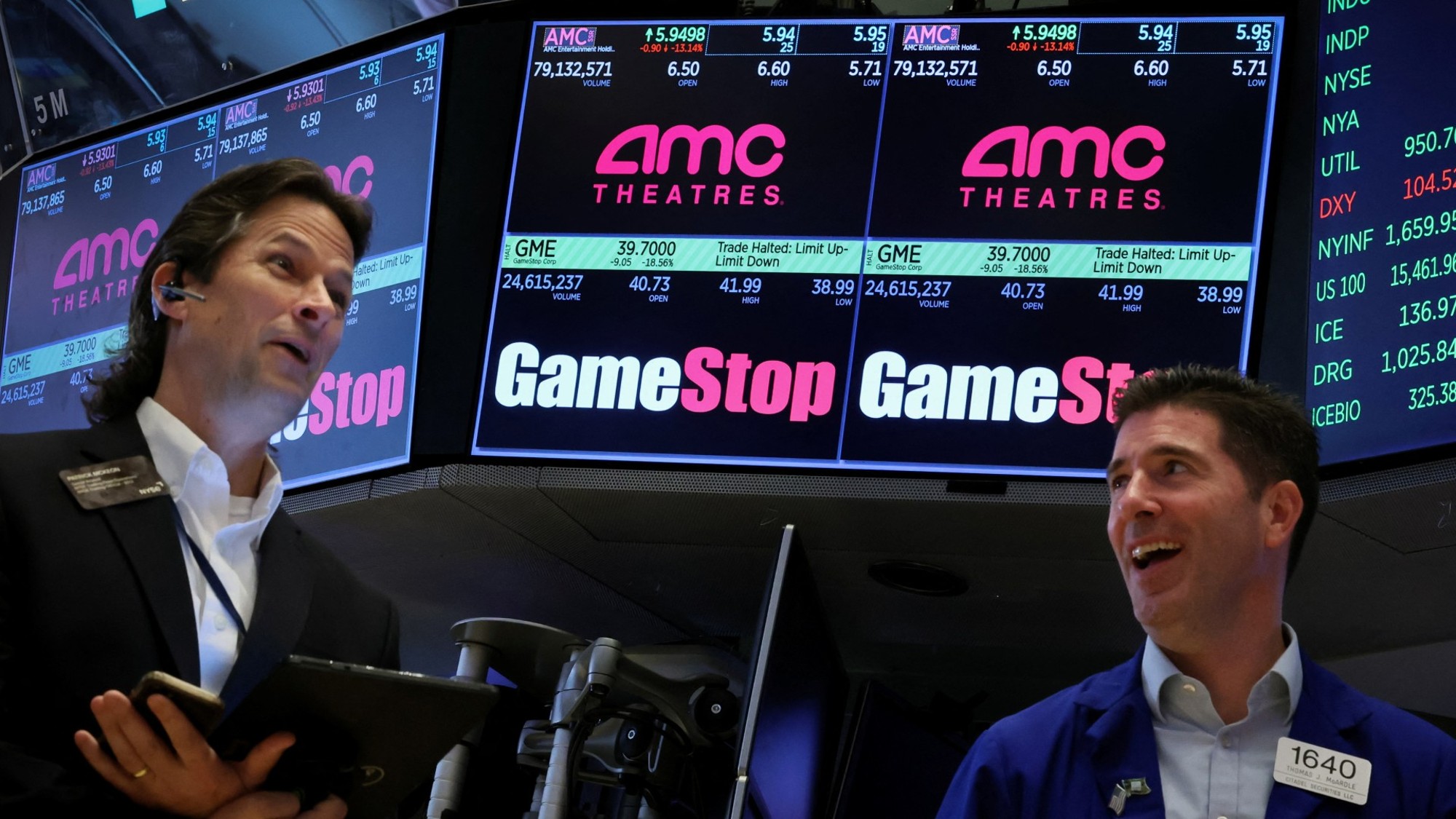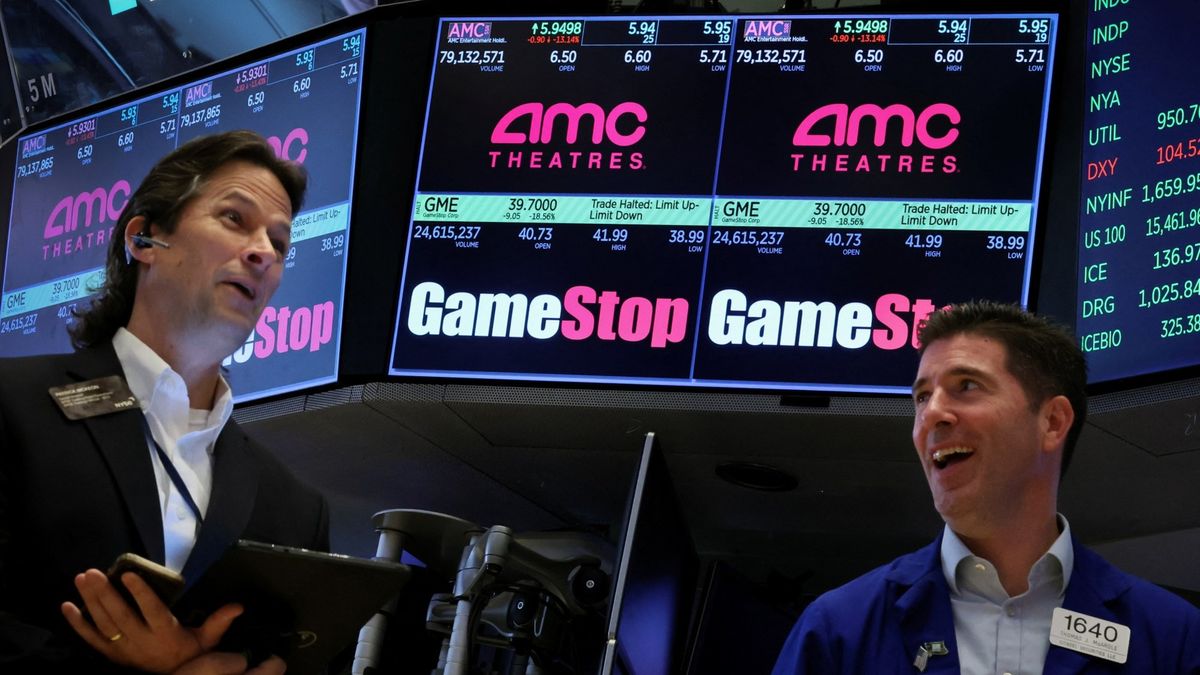Like the rise and fall of a stock ticker, one notable Wall Street trend from a few years ago has made its way back into the zeitgeist: meme stocks. They first came onto the scene in 2021 with stocks like GameStop, which created such a fervor that Sony Pictures made an entire film about the company’s rise to the top called “Dumb Money.”
So it is perhaps unsurprising that GameStop was among the first meme stocks to see a resurgence earlier this May, along with other prior meme stocks such as AMC Theaters. But just as quickly as they rose, the meme stocks fell. “Investor appetite for ‘meme stocks’ may already be waning,” CBS News said, just days after they returned to the scene.
So what exactly are meme stocks, and what makes them unique on Wall Street? And why are they back in the conversation after a yearslong hiatus?
Subscribe to The Week
Escape your echo chamber. Get the facts behind the news, plus analysis from multiple perspectives.
SUBSCRIBE & SAVE
Sign up for The Week’s Free Newsletters
From our morning news briefing to a weekly Good News Newsletter, get the best of The Week delivered directly to your inbox.
From our morning news briefing to a weekly Good News Newsletter, get the best of The Week delivered directly to your inbox.
What are meme stocks?
Meme stocks are “shares of a company that have gained viral popularity due to heightened social sentiment,” said Investopedia. This rise in social standing is typically the result of “activity online, particularly on social media platforms.” Oftentimes, this is accomplished through communities on these social media platforms that can “dedicate heavy research and resources toward a particular stock,” such as Reddit and X.
Companies that become meme stocks “have usually performed poorly in recent years, and attracted attention from short-sellers — investors who effectively bet on the price of a share going down further,” said Forbes. Part of their appeal is that these stocks are often perceived as underdogs, but there is “little connection between a company’s meme stock status and its actual performance.”
What are some notable meme stocks?
The aforementioned GameStop is likely the company most associated with meme stocks. In January 2021, the company underwent a short squeeze, or a “flood of retail trading that drove its shares to extreme highs, which in turn squeezed short sellers who had bet against it,” said the financial services publication Seeking Alpha. This then drove the price of GameStop way up on Wall Street; on Jan. 27, 2021, the company had its largest-ever single-day stock gain of more than 134%, according to Seeking Alpha. At one point during the rush, GameStop was even worth more than American Airlines. But the pandemonium of the stock soon ran dry, and by March 2021 the company had leveled out.
Other notable meme stocks have included the also-aforementioned AMC, as well as companies like Carvana, Kodak and Beyond Meat. Trump Media & Technology Group, the media holding company formed by Donald Trump, has also been identified by Axios and other publications as a meme stock.
Why are they back in the news?
As with 2021, the current resurgence of meme stocks can be partially traced back to one man: financial investor Keith Gill. Known by his online persona Roaring Kitty, Gill had gone quiet after the 2021 boom, but recently “made a triumphant return to the internet with a single post that sent GameStop and other meme stocks soaring,” said Quartz.
Gill “drove the first short-squeeze of the video game retailer’s stock in early 2021,” and by simply emerging back online with a post on May 12, 2024, shares of GameStop “soared once again … closing out the trading day up almost 75%,” said Quartz. Gill, whose financial prowess was the impetus for the aforementioned Sony Pictures film, has singlehandedly caused shifts in the stock market, and his return has got some people talking about “potential for a new meme stock renaissance.”
This time around, though, companies “have more shares trading in the market than they did in 2021, which could lessen the chances of what’s called a ‘short squeeze,'” said Nick Battista, the director of market intelligence at financial network tastylive, to The Associated Press. This means that there is likely to be less of a frenzy around the stocks now.
Indeed, just days after Gill’s online post, shares of both GameStop and AMC plummeted, with AMC falling 16% while GameStop gave up nearly half of its recent gains to fall 20%. Although meme stocks “[generate] a lot of market engagement, which is ultimately a good thing … the volatility in these stocks is extreme,” JJ Kinahan, the CEO of IG North America, said to Reuters.


